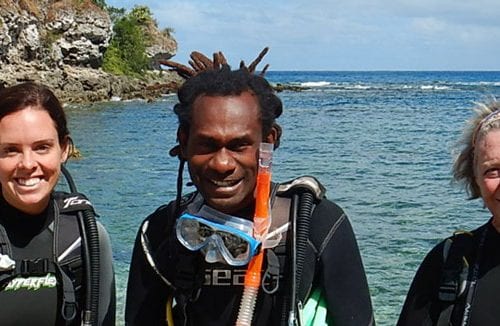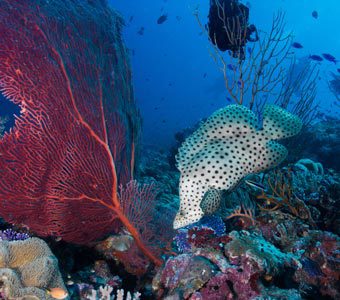The Coral Sea Foundation has taken its Sea Women of Melanesia program up a notch with a couple of intensive training programs, the first, held in PNG’s Conflict Islands, providing 17 indigenous women with the skills to protect their surrounding marine environment.
The intensive program for this large group was made possible largely thanks to a generous donation from P&O Cruises Australia, with PADI Asia Pacific providing training materials free of charge.
The intensive two-week course, developed in partnership with Conflict Islands Conservation Initiative (CICI) in PNG, and Dive Munda in the Solomon Islands, includes training in conservation theory, scuba diving and marine biology survey techniques so they have the skills to communicate the need for marine reserves to their local communities & are able to identify areas suitable for marine protected areas for future conservation.
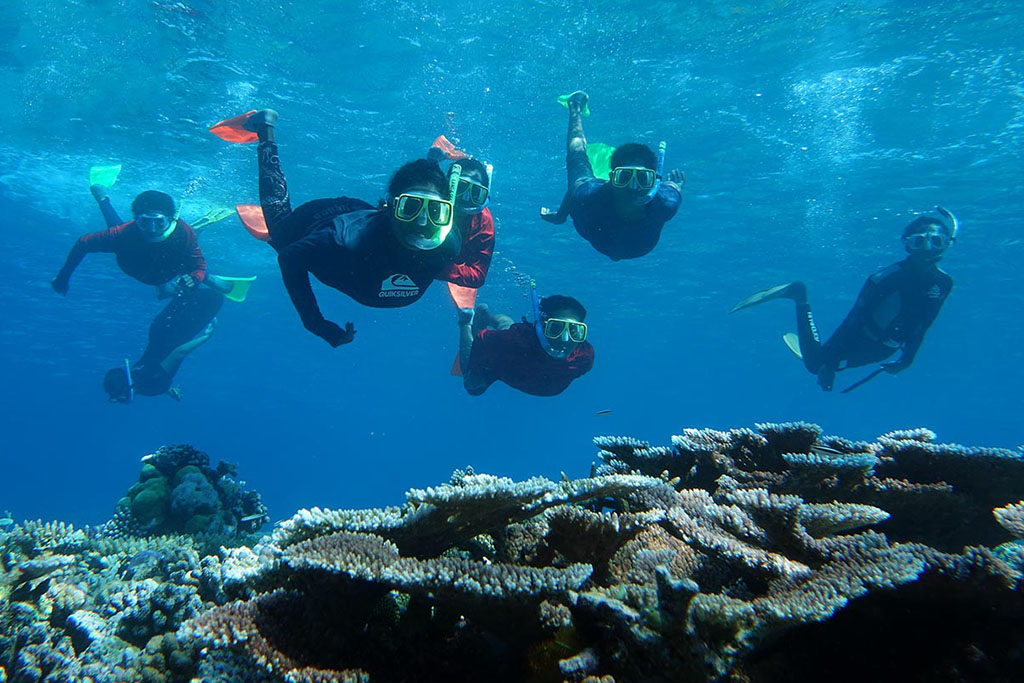
The first intensive course held in the Conflict Islands Resort wrapped up recently. Over a two-week period, the Sea Women of Melanesia program empowered 17 local PNG women to be custodians of their local reefs, in their traditionally matrilineal societies.
The course taught them how to identify areas that need protection, how to work closely within their communities and neighbouring communities to establish ways to protect their reefs and help sustain their traditional livelihood, assisting traditional resource owners for many years to come.
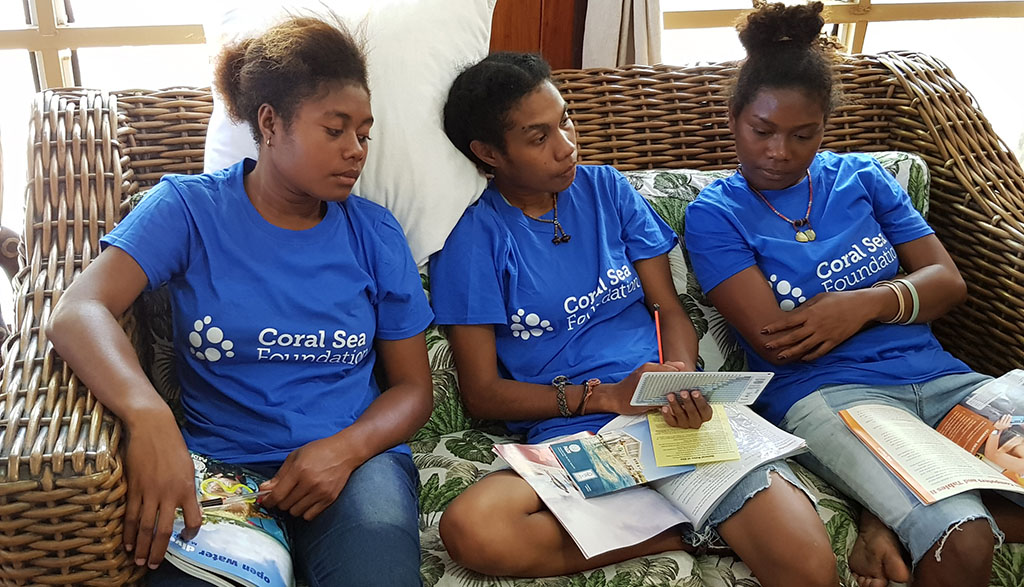
Milne Bay Province is the biggest maritime province of PNG, a diverse area of small island groups spread over a wide expanse. The income of the islands is low, with most island communities relying on the marine environment to survive.
Fishing for the village is commonplace, but it’s the illegal side of fishing that is causing problems. With the growing needs of a developing modern society in PNG, some fishermen have resorted to unsustainable practices, including shark finning and turtle poaching, affecting all aspects of this delicate coral reef ecosystem.
Conservation International’s ecological report found that the reefs around Milne Bay held an identified total of 418 Scleractinia coral species, which is more than half the world’s species, seven of which are newly identified species. The protection of Milne Bay’s coral reefs through the establishment of Locally Managed Marine Areas (LMMA’s) will ensure that there is abundant fish life for the villages to survive on in the future.
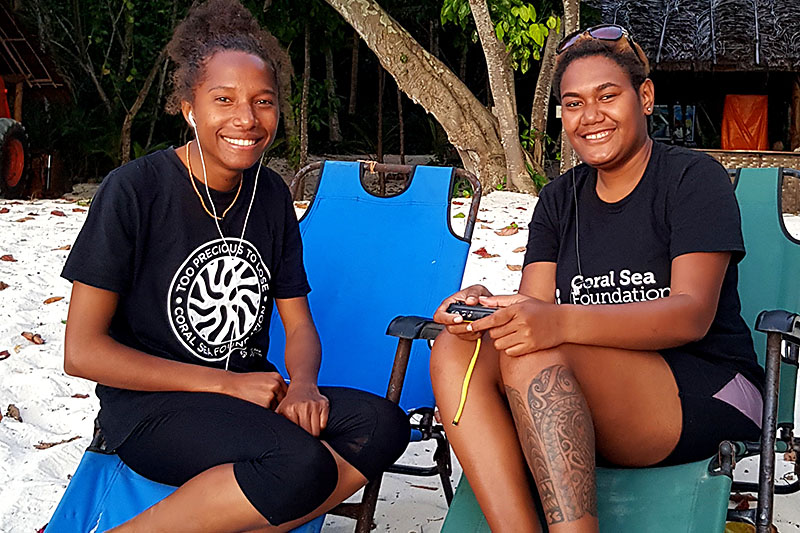
CIC General Manager Hayley Versace says engaging the surrounding island communities is a step in the right direction.
“I only want the best for our neighbouring island communities. They are so kind and generous even when they have nothing. It seems they have been abandoned by the government of the day and the rest of the world with global climate change and access to reliable resources becoming increasingly harder. Running these programs will give the communities the tools to manage the oceans’ natural resources for the future. This will be for the betterment of our neighbors and surrounding oceans. The ocean has given me so much over my lifetime, it is time I start giving something back.”
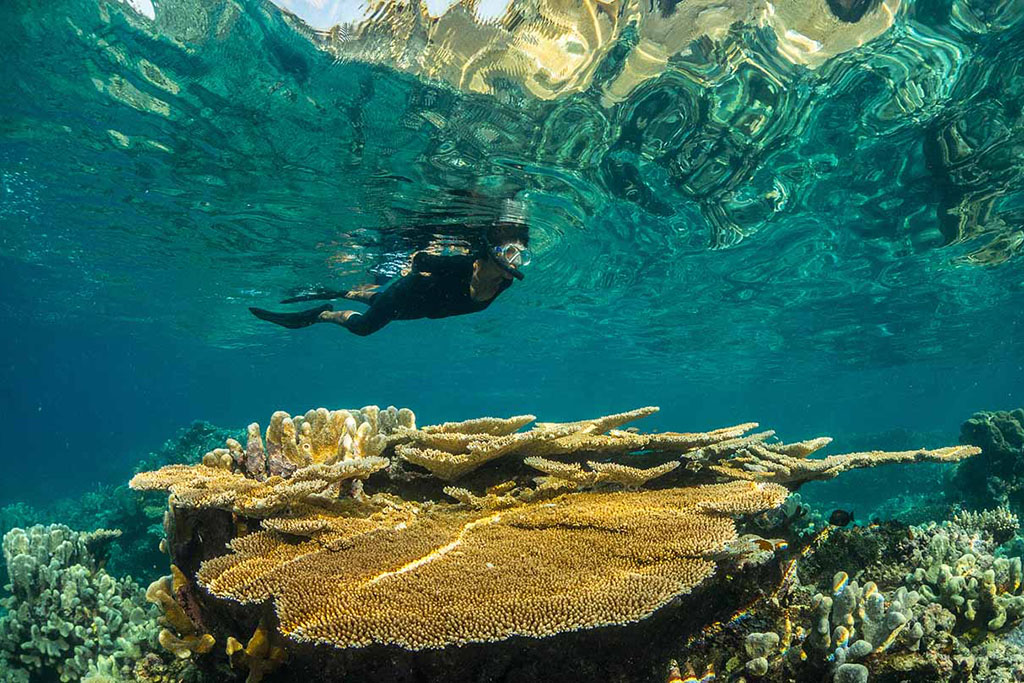
Through the course, the women learnt how to identify areas that need protection, how to work within their communities and neighbouring communities, and to become advocates for marine conservation. These tools and skills acquired are a combination of science, ecotourism, and sustainability, which in turn will help them develop marine reserves that will enhance fisheries and ecotourism resources while improving the basic quality of people in the far-flung rural areas.
While a bit nervous to start with, the 17 enthusiastic Melanesian women had amazing support from the PADI Dive Instructors, and soon took to the water like they belonged there. PADI generously donated training materials for participants, as well as hats and t-shirts for the group.
“We are incredibly grateful for the support of our partners at PADI Asia Pacific and P&O Cruises Australia whose generous funding allowed this group of women to be trained.”
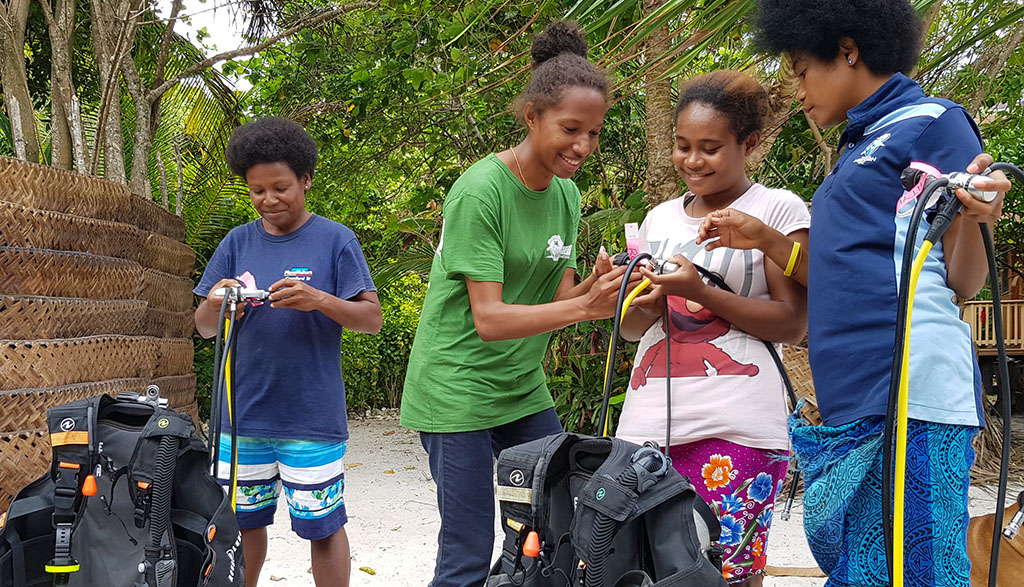
A few participants had never seen the wonders below the surface and others had deep water phobia, nonetheless, as soon as they got comfortable there was no stopping them.
Bathsheba “Benita” Gaunedi from Deboyne Group of Islands shares her experience.
“I never considered the underwater world to be this beautiful. Growing up, my life literally was surrounded by the sea- it was where we washed our cooking and eating utensils; washed our clothes and importantly it was our garden.”
Around here the sea is the highway, the only way island communities can get to other places and access resources like hospitals, it also produces all the communities’ resources.
“We cared less about the health of the corals, the reefs and all that lived in the sea. But then came a time when seashells were hard to find, fishermen returned with small fish or no catch at all and then illegal deals were struck by greedy individuals with outsiders for bech de mer (sea cucumbers) and shark fins.
“I was glad to attend this program because being a woman in my culture leaves me no choice but to follow rules and decisions set by elders of my community who are all men. This opportunity will give me the power to make the change I have always wanted to do.”
Bathsheba enjoyed the two weeks; day-in-day-out. This young mother is determined that all that she achieved and learnt from the SWoM program will not go to waste.
“With this training, I am confident that I will now be able to take back what I have learned and implement in my Locally Managed Marine Area (LMMA) that my island community has set aside. Importantly, I am now able to dive underwater with confidence to monitor marine life.”
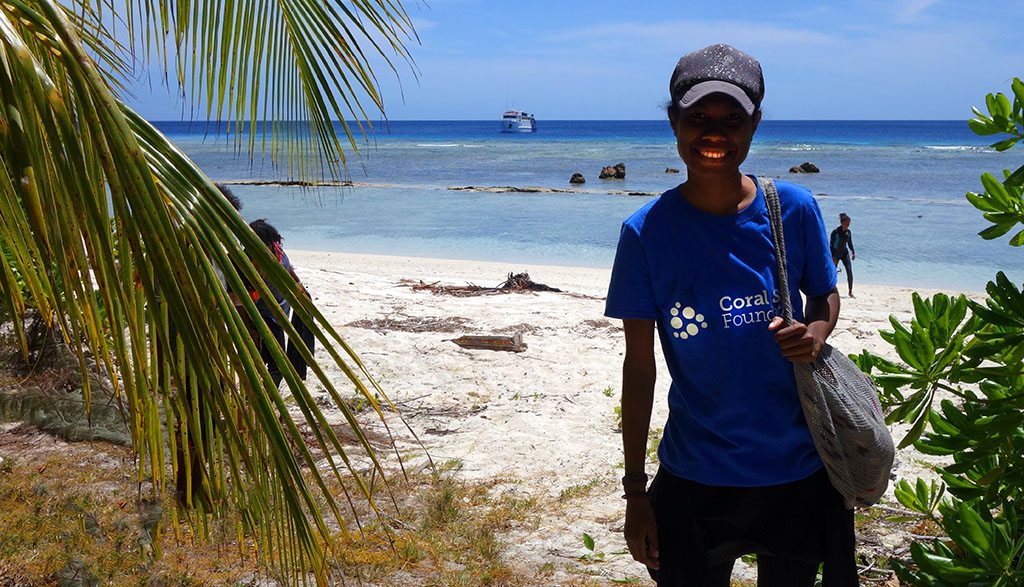
Bathsheba’s story aligns with the other sixteen women’s following this once in a lifetime opportunity.
“I wish to thank all my fellow participants for assisting in one way or another and a big appreciation to my dive-buddy for watching my back in and out of the water and to Terry from Pelagic Dive Travel for his patience.”
According Coral Sea Foundation CEO Andy Lewis, the SWoM Program was inspired by Lorie Pipiga, a young girl from Fergusson Island, Milne Bay Province, and on the numerous trips that Andy has made to PNG, during which he came to realise that there were more girls than boys studying marine science in PNG universities.
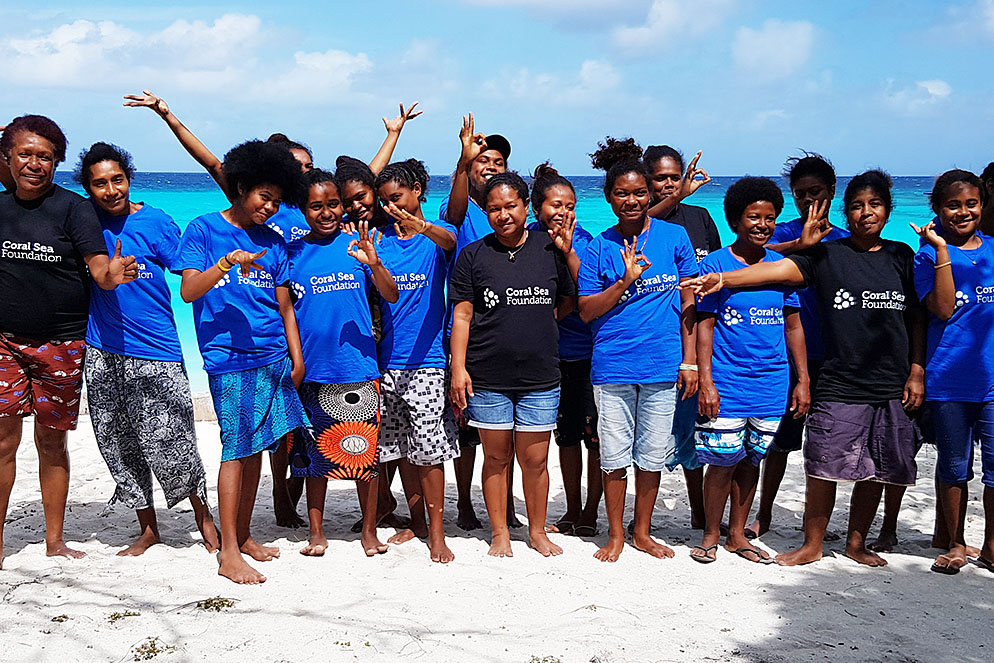
“It was inspiring and moving to see that these women are committed to conservation, however there was lack of additional training. It is now my hope that with support from our partners and sponsors, we can expand the reach of this program in PNG and the Solomon Islands.”
So far so good. From its humble beginnings just two years ago, the Sea Women of Melanesia has grown from just one graduate in 2017, two in 2018 and now in 2019, 17 women have successfully completed the training.

The Sea Women of Melanesia Team
Dr Andy Lewis, CEO of Coral Sea Foundation
Dr Andy Lewis is one of the most skilled & widely travelled ecotourism professionals in the Indo-Pacific region. With a strong background in small ship adventure cruising, he managed the ecotourism activities aboard the luxury vessel True North for over a decade, exploring, delivering outstanding guest experiences across a wide variety of tropical locations. With a PhD in coral reef ecology from James Cook University, Andy’s passion for the reefs, islands & people of the South-Pacific is tangible. This passion drives the development of the Coral Sea Foundation as a platform for delivering the vision for sustainable reef management & the ultimate marine ecotourism experience.
Naomi Longa, Director – Sea Women of Melanesia Program
Naomi is a Papua New Guinean woman from the Island of New Britain, located in the North-Eastern part of Papua New Guinea. Inspired by the sea, she went on to obtain her Bachelor of Science in Biology at the University of Papua New Guinea, and completed her Open Water Diver certificate at the Conflict Islands Conservation Initiative facility in the Louisiade Archipelago. Her drive & determination for keeping a pristine marine environment in her home, matched with her knowledge & understanding of the difficult cultural forces at play in Papua New Guinea make her the ideal mentor for the next generation of Sea Women of Melanesia.
Belinda Botha, Operations Manager, Dive Munda
Belinda is a passionate advocate for the conservation, as well as the continuing education, of the marine environment. Dive Munda has already created many opportunities for the local youth, training them as part of the Dive Munda team. She works ferociously towards protecting and preserving not only the amazing natural resources (above & below the water) but also the traditional & Kastom cultures of the Solomon Islanders.
Euna Zio, Dive Munda SWoM Trainer
Euna is a Munda local woman whose curiosity was sparked by her time working at the Agnes Gateway Hotel. Against the stigma of an “unsafe, man’s job” she learnt to scuba dive. She has continued her training to become the second indigenous dive instructor in the Solomon Islands. Euna is a strong advocate of conservation and women’s empowerment, conducting outreach programs to educate local girls about career choices and protecting the ocean.

